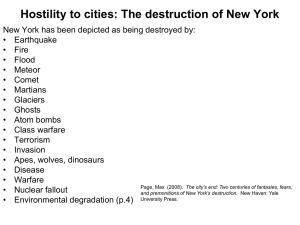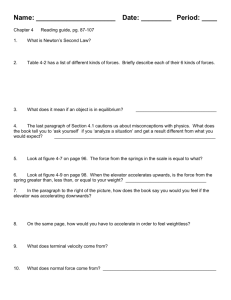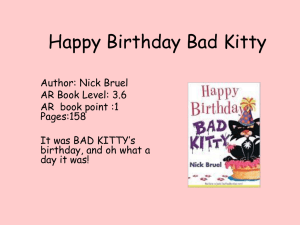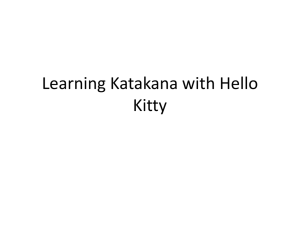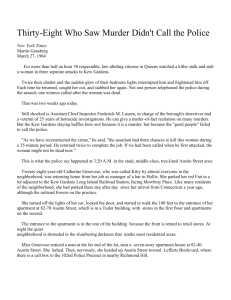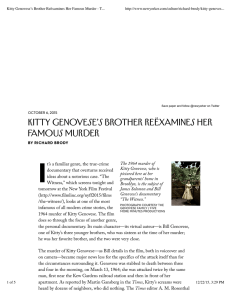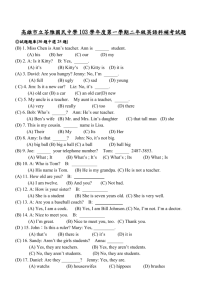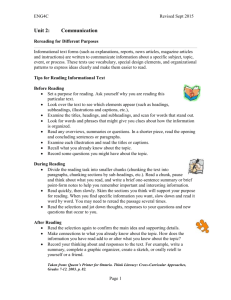Unit 1 – Examining the Concept of Choice
advertisement
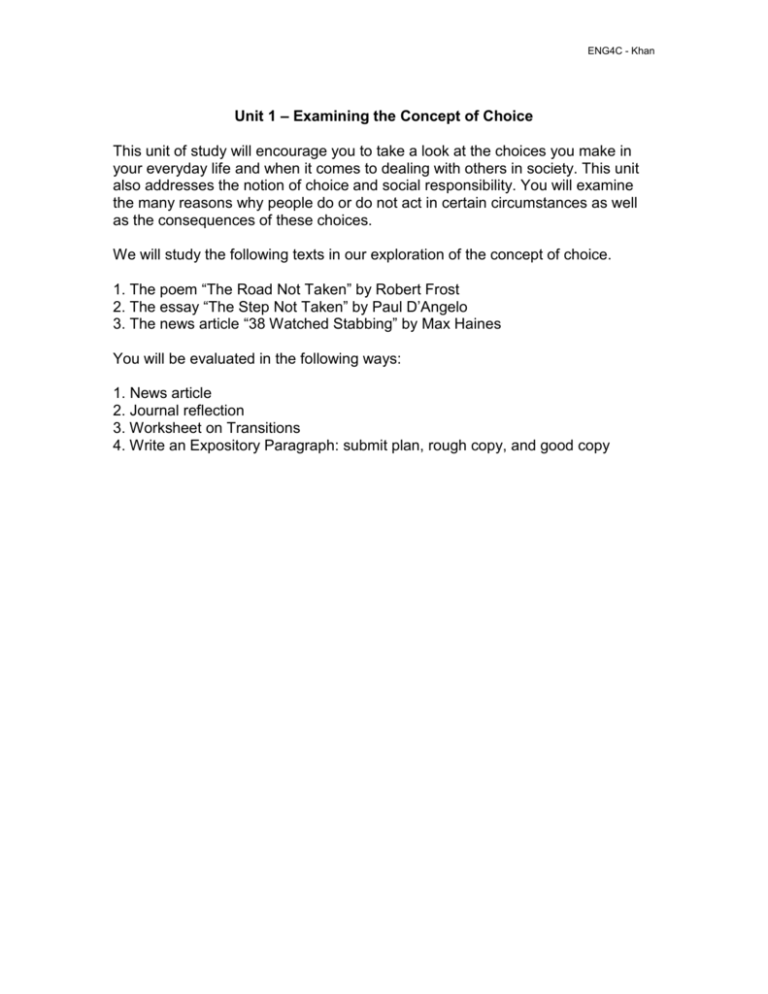
ENG4C - Khan Unit 1 – Examining the Concept of Choice This unit of study will encourage you to take a look at the choices you make in your everyday life and when it comes to dealing with others in society. This unit also addresses the notion of choice and social responsibility. You will examine the many reasons why people do or do not act in certain circumstances as well as the consequences of these choices. We will study the following texts in our exploration of the concept of choice. 1. The poem “The Road Not Taken” by Robert Frost 2. The essay “The Step Not Taken” by Paul D’Angelo 3. The news article “38 Watched Stabbing” by Max Haines You will be evaluated in the following ways: 1. News article 2. Journal reflection 3. Worksheet on Transitions 4. Write an Expository Paragraph: submit plan, rough copy, and good copy ENG4C - Khan The Road Not Taken Two roads diverged in a yellow wood, And sorry I could not travel both And be one traveler, long I stood And looked down one as far as I could To where it bent in the undergrowth; Then took the other, as just as fair, And having perhaps the better claim, Because it was grassy and wanted wear; Though as for that the passing there Had worn them really about the same, And both that morning equally lay In leaves no step had trodden black. Oh, I kept the first for another day! Yet knowing how way leads on to way, I doubted if I should ever come back. I shall be telling this with a sigh Somewhere ages and ages hence: Two roads diverged in a wood, and I-- I took the one less traveled by, And that has made all the difference. ~Robert Frost 1. Using a dictionary, look up the meaning of the following words. Choose the definition that is most appropriate considering how the word is used in the poem. (3 marks) a) diverged b) undergrowth c) trodden (past tense of tread) 2. Describe the choice that the traveler had to make in the poem. Provide details about each option. 3. How has the decision affected the traveler’s life in the years that have passed? Quote the line(s) from the poem that supports this. 4. In one sentence, state what you think the poet is trying to say about choices. Begin with, “I think the poet is trying to say that…” ENG4C - Khan Read the following: Paul D'Angelo The Step Not Taken A few weeks ago I was followed into an office-building elevator by a well-dressed young man carrying a briefcase. He looked very sharp. Very buttoned-down. Wearing gold wire-frame glasses, he was of medium height and build with neatly trimmed brown hair and, I would guess, in his mid-20s. Typical junior executive material. There was nothing about him that seemed unusual. Nothing at all to indicate what was about to take place. The elevator had only one control panel, and I excused myself as I leaned over to his side of the car and pushed the button for the 10th floor. He pushed the button for the 15th. The doors of the elevator closed and we began to ascend. Employing typical Toronto elevator etiquette, I stood staring up at the row of floor numbers above the doors while purposely ignoring my fellow passenger. Then it happened. A sudden strained gasp. Turning toward the noise, I was astonished to see the young man drop his brief-case and burst into tears. Our eyes met for a split second and, as if slapped, he averted his face from me, leaned his head against the wood-panelled wall of the elevator and continued to weep. And what I did next still shames me. The elevator stopped at the 10th floor and, without looking back, I stepped out. I stood in the hallway, a bundle of mixed emotions, wondering what to do. A combination of guilt and uncertainty washed over me. Should I go up to the 15th floor and make sure he's okay? Should I search him out from office to office? Should I risk the embarrass-ment it might cause him? Is he mentally disturbed? A manic depressive, perhaps? Is he a suicide just waiting to happen? I didn't know what to do. So I did nothing. And now he haunts me. Not with fear, of course, but with a sense of regret. I see his face crumbling before he turns to the wall. I see his shoulders heave as he sobs in a combination of sorrow and shame. I wonder now what brought him to that moment in time. How long had he been holding his pain inside before he could no longer contain it? What could possibly have overwhelmed him to such an extent that he was unable to keep from crying out? Had he just visited the doctor and been told that he had an incurable disease? Was he having marital problems? Was his wife ill? His child? Had someone dear recently died? Was he being laid off? Was he looking for a job and meeting with no success? Was he having financial woes? Was he without friends in the city and crushed by loneliness? ENG4C - Khan The sorrows of this world are endless. The few people I have told about the incident all say I did the proper thing, the best thing, by leaving the young man alone. But they are wrong. Like so many things in life, I know now what I should have done then. I should have thrown caution to the winds and done the right thing. Not the big-city thing. The right thing. The human thing. The thing I would want someone to do if they ever found my son crying in an elevator. I should have given him the opportunity to unload his sadness onto my shoulders. I should have reached out a hand and patted him on the back. I should have said something like, "Why don't you let me buy you a cup of coffee and you can tell me all your problems. There's no reason to feel self-conscious. I'll listen for as long as you want to talk." What would his reaction have been to that? Would he have turned even further to the wall? Or would he have turned on me? Cursing me? Telling me to mind my own damned business? Would he have lashed out at me? Sorrow and insecurity turning to rage. Would he have physically attacked me? Or would he have gone with me for that cup of coffee? I don't know. I'll never know. All I can be certain of is I left him in the elevator with tears streaming down his face. And that he was alone. All alone. I hope that somehow he gets to read these words, because I want him to know that I'm pulling for him. That I hope things are looking up for him. That I hope his sorrow is in the past. That I hope he is never again burdened with such awful despair. That I am thinking of him. That I said a prayer for him. That I was wrong, dreadfully wrong, not to step forward in his time of need. That I' m sorry. (Taken from Conrad, R. The Act of Writing 5th ed. Toronto: McGraw-Hill Ryerson, Ltd., 2003.) After reading the essay entitled “The Step Not Taken” by Paul D’Angelo answer the following questions on your own paper and submit them for evaluation. 1. What seems to be D’Angelo’s purpose in writing this essay? What message is he sending to his audience? 2. Outline some advantages and disadvantages of offering to help the stranger on the elevator. 3. Explain “the big city thing” that D’Angelo refers to in paragraph 11. ENG4C - Khan 38 Watched Stabbing by Max Haines The neighbourhood was middle class; ordinary people leading ordinary lives. The crime and violence often associated with New York City didn't apply to the Kew Gardens section of Queens. Tree lined streets, Tudor styled store fronts — Kew Gardens was a good place to live. Catherine Genovese lived there. In the early hours of March 13,1964, the twentyeight year old bar manager cried out to her neighbours for help. Her plea went unheeded. At precisely 3:20 a.m. Kitty, as she was known to everyone in the neighbourhood, parked her red Fiat in the Long Island Railroad Station parking lot. She locked her car and, as usual, started walking toward the door leading to her apartment at 82-70 Austin Street. Shops along Austin Street occupy the first floor. Apartments are on the second. Because of this, the entrance to Kitty's apartment was at the rear of the building, about one hundred feet from where she parked her car. Just as she was about to proceed to her apartment she noticed a man lurking at the far end of the parking lot. Otherwise the streets were deserted. Apprehensive about the stranger, she decided to walk along Austin Street toward a police call box. Kitty could hear the footsteps of the man following her. He was gaining rapidly. Under a street light, in front of a bookstore, and directly across from a ten storey apartment building, the man grabbed the terrified woman. Kitty screamed, "Oh my God, he stabbed me! Please help me! Please help me!" Lights blinked on in the apartment building. Windows slid open. Someone shouted, "Let that girl alone." The attacker shrugged and walked down Austin Street. No one came to Kitty's assistance. No one called the police. The windows of the apartment building slid closed. One by one the lights went out. Down on the street, Kitty Genovese got to her feet. Staggering slightly, she slowly retraced her steps, desperately trying to get to the safety of her apartment entrance. She made it to the side of her building. To her horror her assailant had returned. Again he grabbed her and stabbed her once more. Kitty screamed, "I'm dying, I'm dying." More windows opened, more lights went on. Kitty's attacker walked down Austin Street, got into his car and drove away. Behind closed windows, apprehensive eyes peered down at the scene below. Still no one came to Kitty's assistance. ENG4C - Khan One by one, like snuffed out candles, the lights of the apartments blinked off. Now bleeding profusely Kitty rose once more to her feet. Staggering and falling, she made her way to the rear of her building. She managed to open the door to the building and half crawled to the foot of the stairs. Unbelievably, her assailant returned for the third time and stabbed her once more, this time fatally. Then he disappeared into the night. At 3:50 a.m. a neighbour of Kitty's called the police. They took only two minutes to arrive at the scene. The man who had made the call explained that he had consulted with a friend by phone in another section of the city before he placed the call. Why hadn't he called earlier? He told the police he didn't want to get involved. The investigation into Miss Genovese's death was strange and frightening in many ways. Thirty two minutes had elapsed from the time she had parked her car in the station parking lot until the police arrived at the scene of the murder. On two occasions the killer had left and re-turned. Had anyone called the police, most certainly Miss Genovese would not have been killed. To summon the police by phone in that section of Queens, it is only necessary to dial zero. Kitty's neighbours, many of whom knew her well, were interviewed by police and reporters. Incredibly 38 individuals had witnessed the attacks and not one had called the police. Hardened homicide detectives, who had thought they had witnessed every human emotion, were at a loss as to why all 38 citizens had chosen not to make a simple telephone call. They all recognized the reluctance of citizens to become involved when there is a risk of danger to themselves, but this was a different situation. An anonymous phone call from the safety of your own home cannot be considered a dangerous act. Later the reluctant witnesses gave a variety of answers: "I put out the light and we were able to see better." "I don t know." "I didn't want my husband to get involved." "I was tired." "Frankly, we were afraid." "We thought it was a lovers' quarrel." "I just took a look and went back to bed." Winston Moseley a 29-year-old business machine operator was later charged with the Genovese murder. When questioned he confessed to killing two other women, as well as raping and robbing scores of others. He was a married man with two children and no previous record. He had returned to kill Miss Genovese for fear that she could identify him. At Moseley’s trial, when the jury brought in a verdict of guilty with a recommendation for the death penalty, the court spectators stood and cheered. Amongst those who cheered that day were several of the 38 witnesses who didn't dial zero to save Catherine Genovese’s life. ENG4C - Khan After reading the article entitled “38 Watched Stabbing” by Max Haines answer the following questions. Consider the following definitions: TONE: the attitude or feeling that comes across in a piece of writing, revealed by the writer’s word choice and general writing style. The tone can be serious, angry, satirical, humourous, sarcastic, sad, etc. IRONY: a literary device that creates a contrast or discrepancy between what is said and what is meant. Irony of situation is a contrast between what is expected to happen and what does happen. For example: an orphan becomes a millionaire, a peace activ-ist is shot to death. 1. Explain the irony in the final paragraph of this article. 2. What is the author’s tone? Use direct quotations from the article that clearly indicate this tone. 3. In social psychology, there is a phenomenon referred to as the Bystander Effect. This theory speculates that as the “number of bystanders increases, the likelihood of any one bystander helping another decreases.” As a result, additional time will pass before anyone seeks outside help for a person in distress. Another hypothesis is something called the Diffusion of Responsibility. This is simply a decrease in the feeling of personal responsibility one feels when in the presence of many other people. The greater the number of bystanders, the less responsibility the individual feels. In cases where there are many people present during an emergency, it be-comes much more likely than any one individual will simply do nothing. (www.crimelibrary.com) How do the theories of the Bystander Effect and the Diffusion of Responsibility apply to the case of Kitty Genovese? What would have likely been the result if she had been attacked in an isolated area with only one bystander? ENG4C - Khan News Article Choose a news article that deals with the concept of choice. The article may deal with either a positive or negative choice that an individual or group has made or has to make or a choice that society has to confront. (Hint: environmental or political issues) The Headline _____________________________________________________ Identify the 5WH. Who ____________________________________________________________ What ____________________________________________________________ Where __________________________________________________________ When ___________________________________________________________ Why ____________________________________________________________ How ____________________________________________________________ Write a brief summary of the news article using the 5WH. ________________________________________________________________ ________________________________________________________________ ________________________________________________________________ ________________________________________________________________ ________________________________________________________________ ________________________________________________________________ ________________________________________________________________ ENG4C - Khan Why do you think this choice is an important one? ________________________________________________________________ ________________________________________________________________ ________________________________________________________________ Journal Entry Describe a time when the actions of a stranger made you wonder how to react. Did you get involved? Ignore the situation? Outline the choices you faced and the rationale for your decision. Reflect on this choice. Do you regret it today? Did you make the right choice based on the circumstances? Explain. OR Describe how you would have reacted had you been in the elevator when the stranger broke down and cried. Reflect and explain why you would have acted the way you did. Using Transitions Transitions are words or phrases that connect ideas. Using them in your writing will help the reader understand relationships such as time, space, emphasis, example, contrast, etc. Under the bold headings are examples of transition words that help ideas flow smoothly. Time About After Finally As soon as Tomorrow First Location Among Behind Below Near In front of throughout Contrast Although Still Yet However But On the other hand Addition For instance Besides Another Again Additionally Also Conclude Finally Lastly To sum up Therefore As a result All in all Look at some examples of sentences that contain transitions: On the weekend, we went to the library. Afterwards, we went shopping. Martha is very selfish with her money. In contrast, Jennifer is extremely generous. I get very nervous when I have to present in front of my peers. As a result, I try to avoid these situations. ENG4C - Khan The following paragraph has no transition words or phrases. Rewrite it with transitions to improve its coherence. Submit this corrected paragraph for evaluation No person can live in the world alone. Each person depends on hundreds of others to provide the basic needs of food and transportation. We depend on people for love and understanding. There are times when we need to be on our own with nature and our inner thoughts. We need to reach a balance between being alone and being with others. We will find happiness. (Adapted from Language Power Book G. Toronto: Gage Educational Publishing Com-pany, 2000., and Write Source 2000 Scarborough: Nelson Publishing Company, 1999.)
